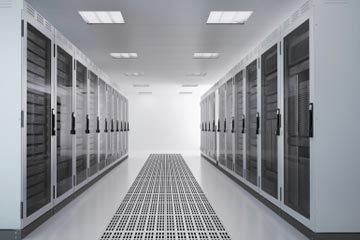
A large corporation might deploy its VPN alongside other network equipment at a co-location facility or data center like the one shown here.
While a VPN can be configured on generic computer equipment such as standard servers, most businesses opt for dedicated equipment optimized for the VPN and general network security. A small company might have all of its VPN equipment on site or, as mentioned earlier, might outsource its VPN services to an enterprise service provider. A larger company with branch offices might choose to co-locate some of its VPN equipment, meaning that it will set up that equipment in a co-location facility (orcolo). A colo is a large data center that rents space to businesses that need to set up servers and other network equipment on a very fast, highly reliable Internet connection.
As mentioned earlier, there is no standard that all VPNs follow in terms of their setup. When planning or extending a VPN, though, you should consider the following equipment:
- Network access server -- As previously described, a NAS is responsible for setting up and maintaining each tunnel in a remote-access VPN.
- Firewall -- A firewall provides a strong barrier between your private network and the Internet. IT staff can set firewalls to restrict what type of traffic can pass through from the Internet onto a LAN, and on what TCP and UDP ports. Even without a VPN, a LAN should include a firewall to help protect against malicious Internet traffic.
- AAA Server -- The acronym stands for the server's three responsibilities: authentication, authorization and accounting. For each VPN connection, the AAA server confirms who you are (authentication), identifies what you're allowed to access over the connection (authorization) and tracks what you do while you're logged in (accounting).
One widely used standard for AAA servers is Remote Authentication Dial-in User Service (RADIUS). Despite its name, RADIUS isn't just for dial-up users. When a RADIUS server is part of a VPN, it handles authentication for all connections coming through through the VPN's NAS.
VPN components can run alongside other software on a shared server, but this is not typical, and it could put the security and reliability of the VPN at risk. A small business that isn't outsourcing its VPN services might deploy firewall and RADIUS software on generic servers. However, as a business's VPN needs increase, so does its need for equipment that's optimized for the VPN. The following are dedicated VPN devices a business can add to its network. You can purchase these devices from companies that produce network equipment, such as Cisco:
- VPN Concentrator -- This device replaces an AAA server installed on a generic server. The hardware and software work together to establish VPN tunnels and handle large numbers of simultaneous connections.
- VPN-enabled/VPN-optimized Router -- This is a typical router that delegates traffic on a network, but with the added feature of routing traffic using protocols specific to VPNs.
- VPN-enabled Firewall -- This is a conventional firewall protecting traffic between networks, but with the added feature of managing traffic using protocols specific to VPNs.
- VPN Client -- This is software running on a dedicated device that acts as the tunnel interface for multiple connections. This setup spares each computer from having to run its own VPN client software.
So far, we've looked at the types of VPNs and the equipment they can use. Next, let's take a closer look at the encryption and protocols that VPN components use.


